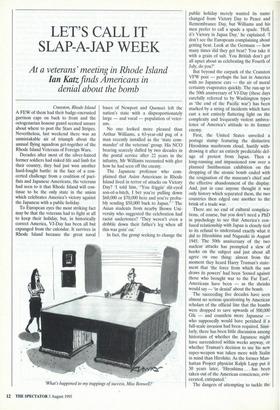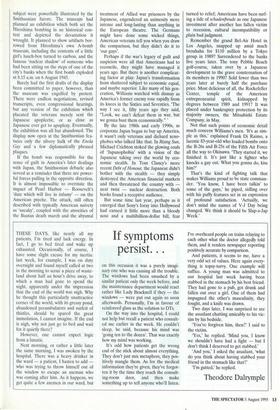LET'S CALL IT SLAP-A-JAP WEEK
At a veterans' meeting in Rhode Island
Ian Katz finds Americans in
denial about the bomb
Cranston, Rhode Island A FEW of them had their badge-encrusted garrison caps on back to front and the octogenarian honour guard seemed unsure about where to post the Stars and Stripes. Nevertheless, last weekend there was an unmistakable air of triumph about the annual flying squadron get-together of the Rhode Island Veterans of Foreign Wars.
Decades after most of the silver-haired former soldiers had risked life and limb for their country, they had just won another hard-fought battle: in the face of a con- certed challenge from a coalition of paci- fists and Japanese Americans, the veterans had seen to it that Rhode Island will con- tinue to be the only state in the union which celebrates America's victory against the Japanese with a public holiday.
To European eyes the most striking fact may be that the veterans had to fight at all to keep their holiday, but, in historically correct America, VJ-Day has been all but expunged from the calendar. It survives in Rhode Island because the great naval bases of Newport and Quonset left the nation's state with a disproportionately large — and vocal — population of veter- ans.
No one looked more pleased than Arthur Williams, a 63-year-old pug of a man recently installed as the 'state com- mander' of the veterans' group. His NCO bearing scarcely dulled by two decades in the postal service after 22 years in the infantry, Mr Williams recounted with glee how he had seen off the enemy.
The Japanese professor who com- plained that Asian Americans in Rhode Island lived in terror of attacks on Victory Day? 'I told him, "You friggin' slit-eyed son-of-a-bitch, I bet you're pulling down $60,000 or $70,000 here and you're proba- bly sending $50,000 back to Japan."' The Asian students from nearby Brown Uni- versity who suggested the celebration had racist undertones? 'They weren't even a dribble down their father's leg when all this was goin' on.'
In fact, the group seeking to change the 'What's happened to my trappings of success, Miss Benwell?' public holiday merely wanted its name changed from Victory Day to Peace and Remembrance Day, but Williams and his men prefer to call a spade a spade. 'Hell, it's Victory in Japan Day,' he explained. 'I don't see the Europeans complaining about getting beat. Look at the Germans — how many times 'did they get beat? You take it with a grain of salt. You British don't get all upset about us celebrating the Fourth of July, do you?'
But beyond the carpark of the Cranston VFW post — perhaps the last in America with no Japanese cars — the air of moral certainty evaporates quickly. The run-up to the 50th anniversary of VJ-Day (these days carefully referred to by Washington types as `the end of the Pacific war') has been marked by a string of incidents which have cast a not entirely flattering light on the complexity and frequently violent ambiva- lence of America's attitude to its former enemy.
First, the United States unveiled a postage stamp featuring the distinctive Hiroshima mushroom cloud, hastily with- drawing it after an entirely predictable del- uge of protest from Japan. Then a long-running and impassioned row over a planned Smithsonian exhibition on the dropping of the atomic bomb ended with the resignation of the museum's chief and the effective abandonment of the display. And, just in case anyone thought it was only history which separated them, the two countries then edged one another to the brink of a trade war.
There are no end of cultural complica- tions, of course, but you don't need a PhD in psychology to see that America's con- fused relationship with Japan is closely tied to its refusal to understand exactly what it did to Hiroshima and Nagasaki in August 1945. The 50th anniversary of the two nuclear attacks has prompted a slew of books on the subject and just about all agree on one thing: almost from the moment they heard Harry Truman's state- ment that 'the force from which the sun draws its powers' had been 'loosed against those who brought war to the Far East', Americans have been — as the shrinks would say — 'in denial' about the bomb.
The succeeding five decades have seen almost no serious questioning by American scholars of the official line that the bombs were dropped to save upwards of 500,000 GIs — and countless more Japanese — who supposedly would have perished if a full-scale invasion had been required. Simi- larly, there has been little discussion among historians of whether the Japanese might have surrendered within weeks anyway, or whether Truman's decision to use his new super-weapon was taken more with Stalin in mind than Hirohito. As the former Man- hattan Project physicist Ralph Lapp put it 30 years later, 'Hiroshima . . . has been taken out of the American conscience, evis- cerated, extirpated.'
The dangers of attempting to tackle the subject were powerfully illustrated by the Smithsonian furore. The museum had planned an exhibition which both set the Hiroshima bombing in an historical con- text and depicted the devastation it wrought. It planned to show artifacts bor- rowed from Hiroshima's own A-bomb museum, including the contents of a little girl's lunch-box turned to carbon, and the famous 'nuclear shadow' of someone who had been sitting on the steps of one of the city's banks when the first bomb exploded at 8.15 a.m. on 6 August 1945.
Barely had the first drafts of the display been committed to paper, however, than the museum was engulfed by protest. There were endless negotiations, revised transcripts, even congressional hearings, but any version of the exhibition which placated the veterans merely sent the Japanese apoplectic, or as close as Japanese ever get to apoplexy. Eventually, the exhibition was all but abandoned. The display now open at the Smithsonian fea- tures only the silvery hulk of the Enola Gay and a few diplomatically phrased plaques.
If the bomb was responsible for the sense of guilt in America's later dealings with Japan, the Smithsonian debacle also served as a reminder that there are power- ful forces pulling in the opposite direction. It is almost impossible to overstate the impact of Pearl Harbor — Roosevelt's 'date which will live in infamy' — on the American psyche. The attack, still often described with typically American naivety as 'sneaky', coupled with the atrocities of the Baatan death march and the abysmal treatment of Allied war prisoners by the Japanese, engendered an animosity more intense and long-lasting than anything in the European theatre. The Germans might have done some wicked things, American veterans tell you when you draw the comparison, but they didn't do it to 'our guys'.
Perhaps if the war's legacy of guilt and suspicion were all that Americans had to reconcile, they might have managed it years ago. But there is another complicat- ing factor at play: Japan's transformation from shattered subject to economic equal, and maybe superior. Like many of his gen- eration, Williams watched with dismay as America's former enemy rose rapidly from its knees in the Sixties and Seventies. 'The way I see it, fifty years ago they said, "Look, we can't defeat them in war, but we gonna bust them economically."' By the late 1980s and early 1990s, as corporate Japan began to buy up America, it wasn't only veterans and diehard xeno- phobes who talked like that. In Rising Sun, Michael Crichton stoked the glowing coals of `Japanophobia' with a vision of the Japanese taking over the world by eco- nomic stealth. In Tom Clancy's more recent Debt of Honour, the Japanese didn't bother with the stealth — they simply destroyed the American financial markets and then threatened the country with — neat twist — nuclear destruction. Both books found a receptive audience.
But some time last year, perhaps as it emerged that Sony's foray into Hollywood had earned it little more than a bloody nose and a multibillion-dollar bill, fear turned to relief; Americans have been surf- ing a tide of schadenfreude as one Japanese investment after another has fallen victim to recession, cultural incompatibility or .plain bad judgment.
Remember the grand Bel-Air Hotel in Los Angeles, snapped up amid much brouhaha for $110 million by a Tokyo group in 1989? Surrendered to the banks five years later. The tony Pebble Beach golf-course, taken over by a Japanese development to the grave consternation of its members in 1990? Sold fewer than two years later at barely half the purchase price. Most delicious of all, the Rockefeller Center, temple of the American entrepreneurial spirit, kidnapped by degrees between 1989 and 1991? It was placed under bankruptcy protection by its majority owners, the Mitsubishi Estate Company, in May.
Not that such points of economic detail much concern Williams's men. 'It's as sim- ple as this,' explained Frank Di Raimo, a laconic 83-year-old who loaded bombs onto the B-26s and B-25s of the Fifth Air Force all the way to Okinawa. 'They started it, we finished it. It's just like a fighter who knocks a guy out. What you gonna do, kiss him?'
That's the kind of fighting talk that makes Williams proud to be state comman- der. 'You know, I have been talkin' to some of the guys,' he piped, sidling over with his puffy features set in an expression of profound satisfaction. 'Actually, we don't mind the names of V-J Day being changed. We think it should be Slap-a-Jap Week.'



















































 Previous page
Previous page